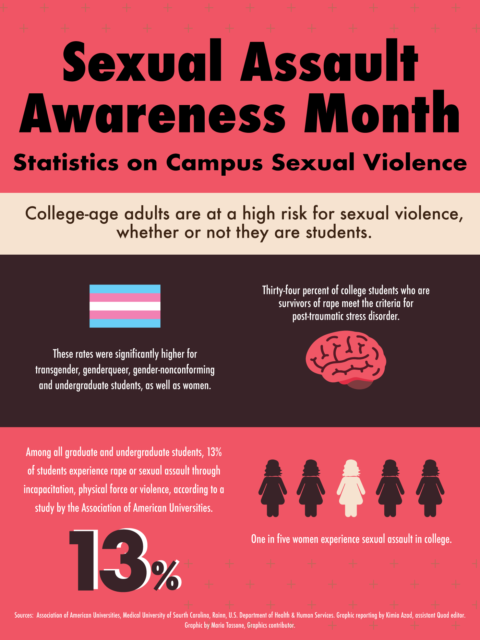This post was updated May 9 at 11:27 p.m.
April is Sexual Assault Awareness Month, but fellow Bruins and Los Angeles community members say awareness and advocacy are important all year round.
According to data collected from 2015 to 2019 by the Association of American Universities, 13% of all graduate and undergraduate students experience rape or sexual assault through physical force, violence or inability to consent. This statistic is especially high among undergraduate students, with 26.4% of females and 6.9% of males in this population surveyed in 2019 experiencing rape or sexual assault, according to the same report.
Ko Smaoui, a fourth-year physics and political science student and the co-director of Bruin Consent Coalition, said sexual assault is included in the broad term of sexual violence.
“Sexual violence is kind of an umbrella term for any sexual harassment, sexual assault, etc. And then usually with sexual assault, the biggest definition under that would be rape, which is penetration, no matter how slight, of … any body part,” Smaoui said.
Jennifer Jiries, the Campus Assault Resources and Education program director, said when supporting a survivor of sexual assault, it’s important to be cautious of the language you are using.
“Generally we encourage … using affirming or validating statements like, ‘I believe you,’ ‘Thank you for telling me, that sounds really hard,’ ‘I’m sorry this happened to you,'” Jiries said, “Asking them what they need and be willing to meet them where they’re at.”
Jiries added that it’s important to show support for the survivor in a positive way and not use any language that will invalidate their story or experience.
“Definitely don’t ask why or how questions like, ‘Why did this happen?’ … or anything that would imply they did something wrong,” she said. “The only how question you should ask is, ‘How can I support you?'”
Jiries said it’s best to not ask questions but to allow the survivor to share what they feel comfortable with in the moment.
Liza Rodriguez, the program director for the sexual assault unit at YWCA Los Angeles, said being a good listener is important when speaking with a survivor, while also letting them know it’s not their fault.
“Listening and validating (the person’s) feelings and how they feel about the situation – that’s what we do here at (YWCA) when they come in to get a sexual assault medical legal exam,” Rodriguez said.
Jiries added that offering resources is only helpful when asked to, so as to not assume someone’s wants or needs.
If resources are needed, how can you help?
Whether they are a UCLA student or even a friend from the Los Angeles area, there are various resources nearby that are open to all survivors of sexual violence.
Jiries said the UCLA Rape Treatment Center can be a place to start. The center is open 24 hours a day during the pandemic.
Additionally, UCLA’s CARE program is designed to help students who have experienced sexual assault through advocacy and healing programs, Jiries said.
“CARE’s advocacy program itself has confidential advocates that meet one-on-one with survivors, so if anybody has experienced sexual assault, sexual harassment, intimate partner violence or stalking and they want to meet with an advocate, the advocate will support them through the healing process – whatever that looks like for that specific survivor,” Jiries said.
Survivors can request help from CARE on reporting to law enforcement or Title IX, accessing safe housing or requesting academic accommodations, she said.
YWCA LA also provides legal support and sheltering to survivors, Rodriguez said.
Sexual assault or any sexual trauma can also have a significant impact on a survivor’s mental health.
In a 2008 study conducted by the Mayo Clinic, researchers set out to see the psychological impacts of rape and sexual violence on a group of over 3 million participants. The study found that there was a statistically significant association between sexual abuse and a lifetime diagnosis of anxiety disorder, depression, eating disorders, post-traumatic stress disorder, sleep disorders and suicide attempts.
Rodriguez said part of YWCA’s support process is referring survivors to therapists who can start counseling immediately.
Jiries said CARE offers healing programs to survivors, including trauma-informed yoga, an art program, a journal program and a program called Hope and Healing that combines mindfulness and journaling together.
CARE and the Bruin Consent Coalition also aim to raise awareness and provide prevention education to the UCLA community.
“(Bruin Consent Coalition) deals with everything from advocacy to prevention education to policy things with Title IX,” Smaoui said.
Prevention training is important in making our community a more informed space, Jiries said.
“(CARE’s) prevention education program does a lot across campus to work with folks to build trauma-informed spaces so that survivors or anyone in the classroom, in the work environment and within the UCLA community, they feel safe and respected,” Jiries said. “We also do training around consent, bystanders, … shifting culture and trying to prevent harm from happening.”
Being an ongoing source of support in a survivor’s life is also extremely impactful, and CARE encourages people to check in with the survivor often, Jiries said.
“I think the key thing to being a really good supportive person and trauma-informed is really to allow the survivor to articulate what they want or need and what their boundaries are,” she said.

